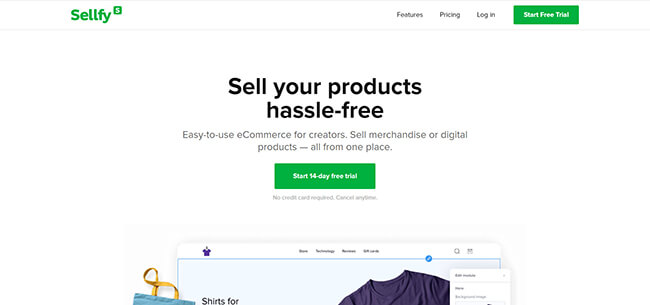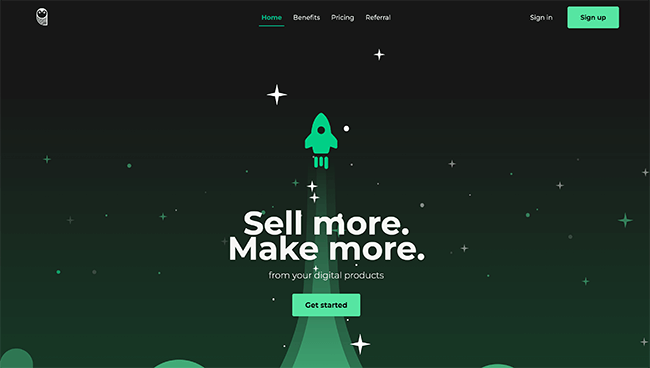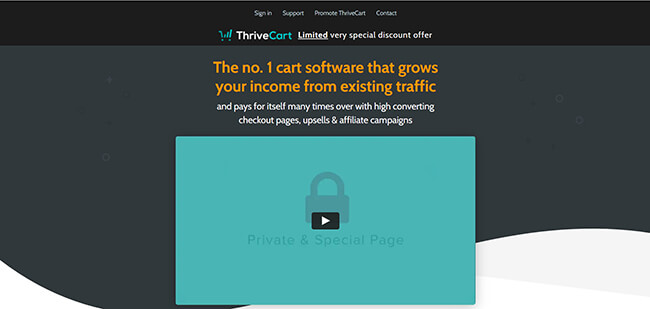The Best Selz Alternatives Compared (2024)

Selz has been acquired by Amazon and is currently not accepting new customers.
That’s a huge blow if you’re looking to set up an online store using this ecommerce platform.
But your dream of becoming a store owner shouldn’t stop here – there are countless Selz alternatives ripe for the picking!
In this post, we’re comparing the top alternatives to Selz so you can make an informed decision and start building your ecommerce empire.
What is the best Selz alternative?
TL;DR:
- Sellfy – The best Selz alternative. A powerful ecommerce platform that makes selling quick and easy.
- Podia – A powerful Selz alternative focused on digital products. Sell courses, downloads, subscribers, and more.
- SendOwl – Another easy-to-use software for selling digital products.
- Shopify – Powerful ecommerce software for all purposes.
- ThriveCart – Powerful cart software designed to improve conversions and lifetime customer value.
- Gumroad – Great for selling digital goods, merch, membership, and software.
- BigCommerce – Powerful store builder best suited to larger online stores.
#1 – Sellfy

Sellfy is designed specifically for those who want to simplify the process of setting up an ecommerce store.
You don’t need to spend hours on setup work. You can get started in minutes. Simply sign up, and you can start selling digital products, physical products, subscriptions, and more.
You can even run a print-on-demand merchandise store. The process is effortless.
You can also create custom storefronts across different social media platforms to increase your reach and revenue.
Over time, you can monitor the performance of your store and goods to understand why they’re selling at the rate they are.
Pricing:
Sellfy has a 14-day free trial. After which, you must choose among three paid plans starting at $19/month billed bi-annually for up to $10k in sales/year and unlimited products.
Features like email marketing, product upselling, and cart abandonment recovery are available on higher plans.
Sellfy offers a 30-day money back guarantee.
Read our Sellfy review.
#2 – Podia

There’s money to be made from online courses especially now that more people are receiving their education in front of their computers.
This is what makes Podia the ideal place for course makers like yourself to start.
After creating a professional website easily, you can host your content here with quizzes and without limits to the number of files to upload. You can also boost your earnings with the help of upsells and different payment plans.
If you want to branch outside of online courses, choose from other product types to host on Podia: webinars, memberships, and digital downloads.
This ecommerce platform also has built-in email marketing features so you can send drip messages to members and engage with them.
Pricing:
Podia offers two paid plans: Mover ($39/month) and Shaker ($78/month). The former has all the basics you’ll need to profit from your knowledge. The latter has everything in the Mover plan plus:
- Membership features
- Blog
- Buy buttons embeddable anywhere
- Affiliate program creation (to help get people to sell your products with a commission fee as a reward)
Podia also has a free plan where you can access most of the features for one product, and includes transaction fees.
Read our Podia review.
#3 – SendOwl

SendOwl is a great alternative to Selz for those who sell digital products from their website. Particularly those embedding cart widgets to their existing site.
From the platform, you can:
- Upload your product for sale
- Integrate with your preferred payment processing
- Create checkouts optimized for conversion
- Get the product delivered instantly after receiving their payment
This simple process allows people who are starting their online selling to get their digital products out to the public without the complex set-up required by other Selz alternatives.
However, don’t let its simplicity fool you. The platform allows you to entertain subscribers or memberships for recurring revenue.
You can also generate more purchases by setting up your affiliate system, rescuing abandoned carts, and running promotions & discounts, among others.
Pricing:
SendOwl’s plans start at $15/month for 30 products and 3GB of storage. This plan includes the ability to run your own affiliate program.
#4 – Shopify

Shopify is one of the best Selz alternatives because it’s not just about selling products. This ecommerce platform aims to help you to launch an online business from the ground up.
You can create a website with an SSL certificate on Shopify where you can sell your products from there. You can also use it as a Point of Sale for your physical stores.
You can then manage the inventory and finances from a single dashboard. This allows you to take full control of your business unlike any other software out there.
The best thing about Shopify is its massive integration with 3rd-party software. Think WordPress and its plugins – you have a host of free and paid integrations to choose from and power up your site with for maximum conversions!
Pricing:
Get started with a 3-day free trial, then $1/month after for 3 months. You will then have to choose from three plans starting at $39/month. All plans offer the ability to sell unlimited products, sell to different channels, recover abandoned carts, and more. Yearly discounts available.
Read our Shopify review.
#5 – ThriveCart

If you’re more interested in developing sales funnels for your business than an ecommerce store, ThriveCart may be the missing piece in your puzzle.
The beauty of shopping carts is you can embed them on your website, blog, social media, and other online properties you have. This gives you the best opportunities to convert your audience into customers or returning ones.
This cart software also allows you to squeeze out as much money from your customers as possible. For instance, you can leverage FOMO by creating limited one-click upsells and bump offers that increase your average order value.
To prevent cart abandonment and overdue subscriptions that don’t get paid, set up automatic follow-ups to remind customers of their upcoming payments.
ThriveCart handles VAT automatically, allows for JV/partner payouts, affiliate management, and integrates with plenty of other platforms.
Finally, you can review the progress of your carts and make necessary adjustments to improve their performance.
Pricing:
ThriveCart is currently running a lifetime deal at a one-time payment of $495 (plus $195 for the PRO upgrade). It includes all features above plus access to an affiliate center, automatic sales tax calculation, JV contracts, and more.
#6 – Gumroad

If you want to sell physical and digital products online without the costs associated with some of the platforms above, Gumroad is a good option.
It’s been around for quite some time now, but the platform keeps adding features that appeal to the common seller, whether they’re just starting or growing at scale.
When selling products, you can generate unique license keys every time a customer purchases them or prevent the illegal downloading of your PDF or course. This ecommerce solution can also convert your book file into different formats (ePub, Mobi, PDF) or even sell it as lossless audio at additional costs.
For physical products, you can set up their variants, manage and charge shipping, and limit sales by country from within the platform.
If you want to launch a membership business, you can also accept payment on a monthly, quarterly, bi-annual, or annual basis.
Pricing:
The tool is free for use, however, there is a 10% transaction fee + processing fees per sale.
#7 – BigCommerce

BigCommerce provides a sturdy foundation for your web store and allows you to design your site with freedom and carry out ecommerce operations securely.
For those who want to launch an ecommerce store fast, you can choose their Essential plan and get started quickly without any headaches.
If your needs are more advanced, you may find the BigCommerce Enterprise offering especially appealing. Thanks to it’s “headless CMS” content can be delivered via an API. Giving you more flexibility and allowing for more content-rich experiences for your customers.
BigCommerce also provides omnichannel marketing support to create multiple touchpoints where prospects can browse through your products. Couple this feature with its powerful analytics that helps you uncover customer data and insights to hike up conversions, and you have a platform that offers an agile environment to help grow and scale your business on the fly.
Pricing:
BigCommerce offers a variety of plans and services to startups who want to get the best out of their online store.
Its Standard plan (starting at $39/month – $29/month billed annually) includes everything you need to run a successful ecommerce website.
For established brands, you’ll need to request a quote to find out the price for their Enterprise plan.
Frequently ask questions
What is the best Selz alternative?
If you’re looking for an end-to-end alternative to Selz, BigCommerce and Shopify are solid options. Both cater to small businesses looking to take their business online and enterprises processing lots of orders. For simplicity and flexibility, we recommend Sellfy.
What is the cheapest Selz alternative?
The cheapest Selz alternative is a coin toss between Gumroad and SendOwl. The former has a free tier but it takes a commission from every sale you make (between 3.5-5%). SendOwl has no free plan (its lowest starts at $9/month) but it doesn’t ask for commission fees.
Is there a free alternative to Selz?
Gumroad is a free alternative to Selz. You can sell products, memberships, or software with relative ease and without the costs associated with the best ecommerce solution.
Which Selz alternatives offer print-on-demand services?
Sellfy is the best Selz alternative that offers print-on-demand services. Their free plan supports print-on-demand so you can get started selling custom merch easily.
Alternatively, there are other ecommerce platforms that can sell print-on-demand products with the help of a third-party such as Printful.
To learn more, check out our article on the best print-on-demand companies.
Which Selz alternative is best for your needs?
From the alternatives to Selz featured above, each has its unique advantages that separate them from one another.
Consider Sellfy if you want the easiest way to create a simple online store. It’s straightforward approach lets you focus on selling and less on everything else.
Shopify is impressive thanks to its deep feature set. If you’d like to create a full online store, there are plenty of ecommerce platforms to choose from, but I’d recommend considering Shopify before any other.
If you’re looking for the bare minimum, you can’t go wrong with Gumroad or SendOwl. Both are cut from the same cloth – lightweight ecommerce platforms that make selling digital products easy.
Podia shares a lot of similarities with the tools above but specializes in hosting and delivering online learning modules. Podia is also ideal for content creators because it allows you to create an entire website, blog, and launch an affiliate program.
Gumroad, however, has had issues with support and takes a significant transaction fee. This has caused some users to seek alternatives.
Other platforms have specific use-cases. For example, ThriveCart works better if you already have an established funnel process and are looking for cart software.
Again, there’s no wrong option with these alternatives to Selz – it’s just a matter of choosing the one that meets your needs best.
Disclosure: Our content is reader-supported. If you click on certain links we may make a commission.
